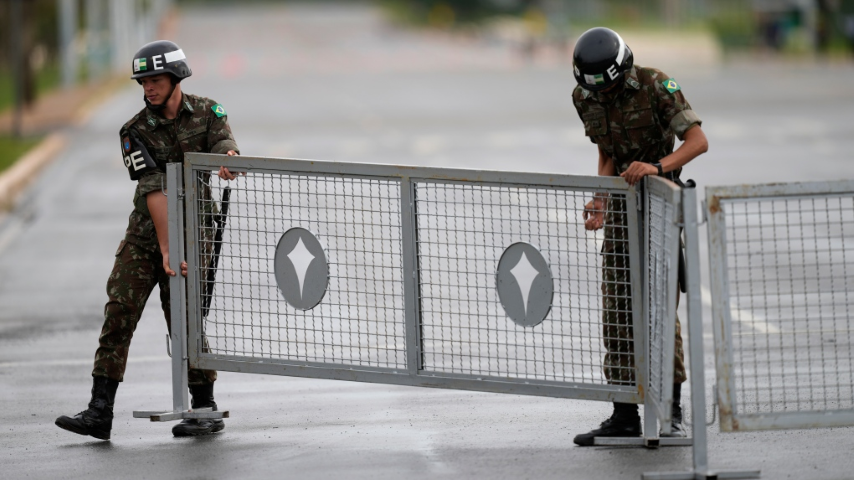
Soldiers prevent access to the Army headquarters in Brasilia, Brazil, marking the first anniversary of protests in favour of former President Jair Bolsonaro. The disturbances on January 8, 2024, saw rioters infiltrate key government institutions, including the presidential palace, Congress, and the Supreme Court buildings. Subsequently, Bolsonaro has faced a Supreme Court investigation regarding his involvement in the unrest. This image was captured by Eraldo Peres and is credited to the Associated Press.
On the anniversary of last year's upheaval in Brazil's capital, commemorations and demonstrations unfolded across the country, underscoring the enduring echoes of the pro-Bolsonaro unrest. Thousands had stormed government buildings, clamouring for a military intervention to unseat President Luiz Inacio Lula da Silva. In response, Federal Police executed numerous search warrants as part of an ongoing probe into those responsible for the chaos.
In a stark departure from the U.S., where former President Donald Trump continues to vie for office amid legal challenges, Brazil's judiciary has sidelined Jair Bolsonaro. The electoral court barred Bolsonaro from seeking office until 2030, unrelated to the riots but linked to baseless claims about the electronic voting system's vulnerability to fraud.
Brazil sought to move beyond the turmoil witnessed a year ago, as the Supreme Court president, Luís Roberto Barroso, labelled it the "most virulent attack on the country’s institutions" since the end of the military dictatorship four decades ago. The scenes of chaos, reminiscent of the U.S. Capitol assault in 2021, prompted reflection and a collective effort to reinforce democratic principles.
The Brazilian Supreme Court inaugurated an exhibition themed on "reconstruction, memory, and democracy," showcasing damaged artifacts from the attack. Concurrently, a pro-democracy event at Congress featured the restoration of a tapestry by artist Roberto Burle Marx, damaged during the riot, and drew dignitaries including Lula and Supreme Court justices.
While street demonstrations in support of democracy materialized across cities, there was a noticeable absence of protests in favor of those facing prosecution for their involvement in the riots. A sentiment echoed by demonstrators like Penélope Toledo in Rio, who characterized the events of January 8, 2023, as an attempted coup, emphasizing the ongoing struggle for democracy.
Contrasting the U.S. response to the Capitol riot, where over 1,200 individuals faced charges, Brazil has filed charges against more than 1,400 individuals, with only 30 convictions to date. The Supreme Court is also investigating Bolsonaro's role in the insurrection. A congressional panel in October implicated Bolsonaro and high-ranking military officials in orchestrating the riots, yet no actions have been taken against them.
As Brazil reflects on the tumultuous anniversary, the majority seems to rally behind Lula's democratic ideals, with a December survey indicating that 89% of Brazilians viewed last year's uprising negatively. However, challenges persist in holding key figures accountable for their alleged roles in the unrest.















